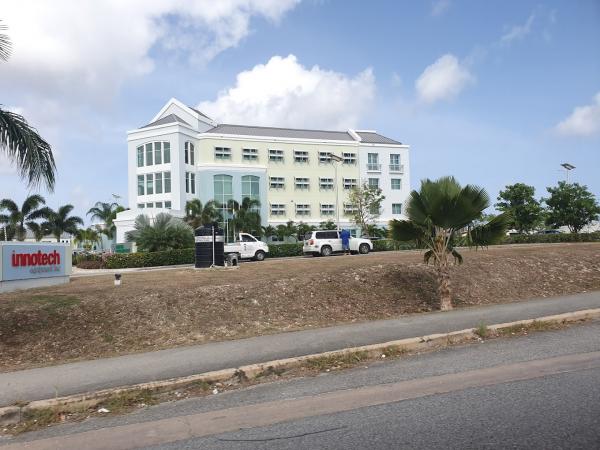The Green Climate Fund: Reducing, Reusing and Recycling Water in Barbados as an adaptation measure
2 Apr 2024 by The Water Diplomat

The Green Climate Fund (GCF) recognises the urgent need for a comprehensive, innovative approach to water security. It emphasizes – amongst others through its call to action - that water resources management is a top priority sector in National Adaptation Plans and other regional climate adaptation plans. In this context, the GCF and The Water Diplomat (TWD) are documenting and sharing a number of current key projects that serve to highlight some of the bold steps that are needed to ensure water security in a changing climate.
TWD was pleased to sit down with Mr. Keithroy Halliday, CEO of The Barbados Water Authority to review and discuss several initiatives geared to build a more climate resilient utility as part of the Government of Barbados active thrust to make the island more climate proof. With focus on adaptation measures, one of the key recently approved projects is one with the Barbados Water Authority in partnership with the Green Climate Fund and with the support of the Caribbean Community Climate Change Centre (CCCCC). The aim of this project is to reduce, reuse and recycle water as an adaptation measure in response to high levels of water scarcity and exposure to climate change. The project costs are U.S. $ 50 million, of which U.S. $ 39.4 million are sourced from the Green Climate Fund and the remaining U.S. $ 10,6 million is to be co-financed through a multilateral agency. The project aims to have an impact on 277,000 beneficiaries, of whom 136,000 are direct beneficiaries.
Barbados ranks as one of the most water scarce countries in the world: with a per capita water availability of 305-310 m³ per capita per annum, the country falls into the category of ‘absolute water scarcity’. Although the country receives a lot of rainfall, the land surface consists of porous limestone, and therefore there are no perennial rivers. Water seeps into underground aquifers through gullies and sinkholes, and therefore more than 80% of its water supply is sourced from a thin lens of groundwater which overlies the salt water underneath. There are various competing demands for this water: 98% of the groundwater sources have been developed and therefore in many ways the country has reached the upper limits of its supply capacity.
In addition, climate change is leading to higher average temperatures, more frequent heatwaves, and a decline in precipitation. Rainfall patterns are becoming more erratic, resulting in severe storm conditions with flash flooding. These events appear to be occurring more frequently, disrupting the sewerage system and producing stormwater runoff that flushes debris, microorganisms and chemicals into the coastal zone, endangering the country’s coral reefs and fish species. In 2018, a sewerage leak occurred during the tourist season, seeping across a large part of the popular south coast, leading to accelerated discussions on the upgrade to the sewage treatment system.
It is in this context that a project has been launched to reduce, reuse and recycle water on the island. In line with the principle of Integrated Water Resources Management (IWRM), a stakeholder engagement process was developed in order to ensure that the project implementation process informs and responds to the positions of different actors during project implementation. The principal outcome of the project is the reuse of wastewater from the Bridgetown Sewage Treatment Plant, both for the purposes of aquifer recharge and for use in agricultural irrigation, boosting local food production.
The sewage treatment plant is to undergo an upgrade to a tertiary treatment system, after which a 9km pipeline from the plant will supply reclaimed water to support irrigation development on a total of 235 hectares of land, benefiting 155 farmers as well as aquifer recharge through at least 6 infiltration wells. In parallel, the wastewater treatment plant will be provided with solar power in an effort to reduce the energy footprint of the installation and to pursue a low emissions pathway for wastewater treatment. This aspect of the project is expected to lead to 40,900 tons of avoided emissions – to be certified by the CCCCC.
Chief Executive Officer, Mr Keithroy Halliday confirms the above and additionally highlights that the project entails institutional development aspects such as the training of staff at the Barbados Water Authority concerning the management and monitoring of the upgraded treatment plant and the implementation of a risk management framework. Further, the programme aims to facilitate the development of an enabling environment for broadening the use of water re-use as a water conservation method at the residential, agricultural and commercial levels through examination and strengthening of legislation and regulatory requirements as required along with all available mains of public outreach to change mindsets in general.
